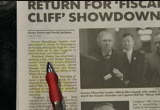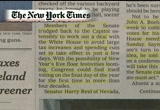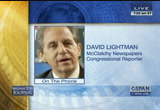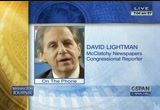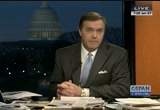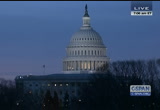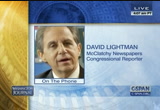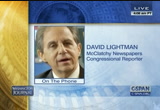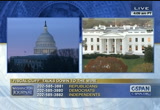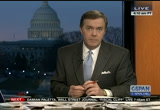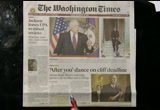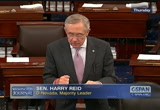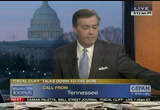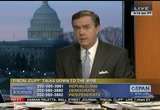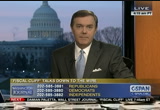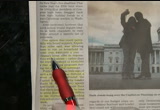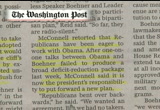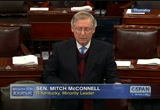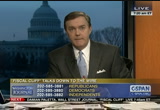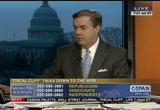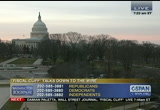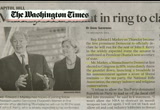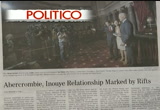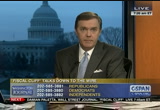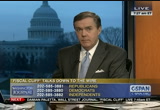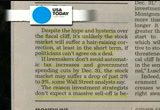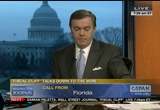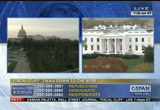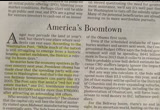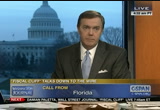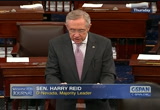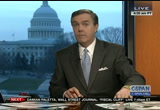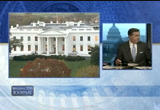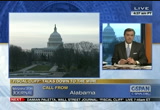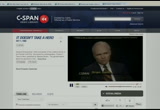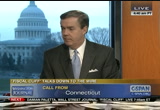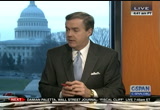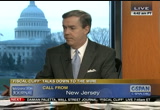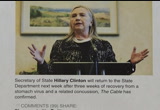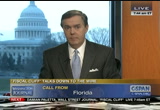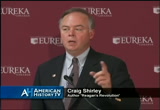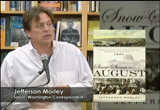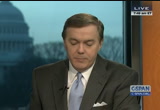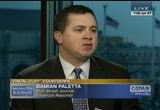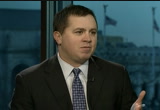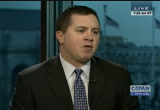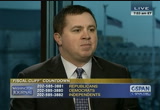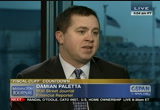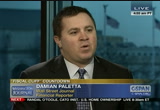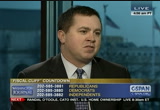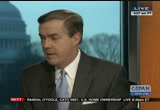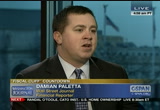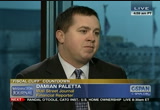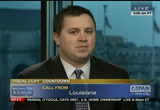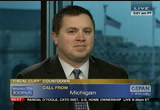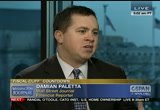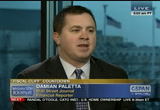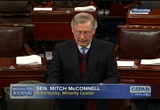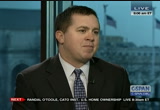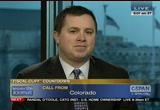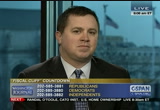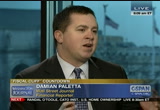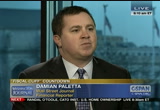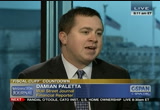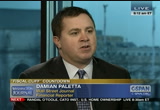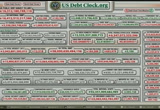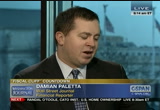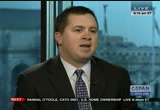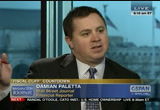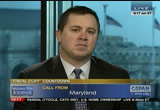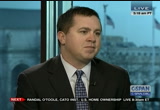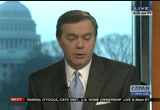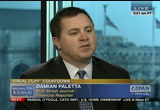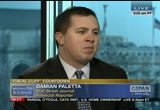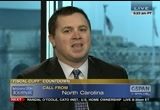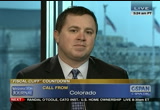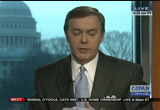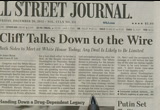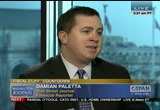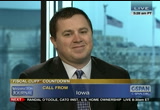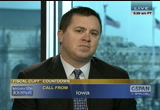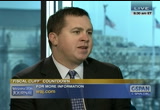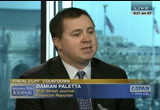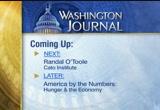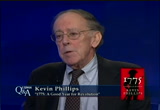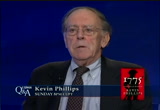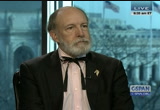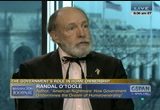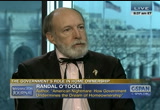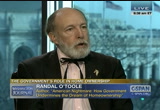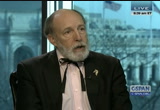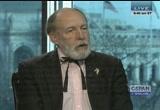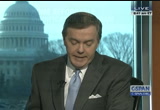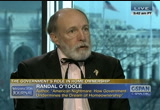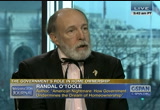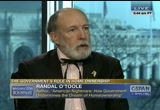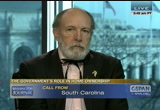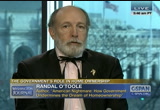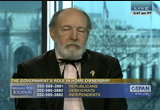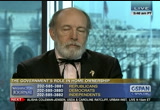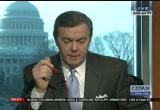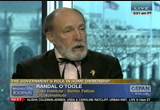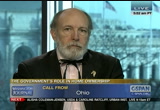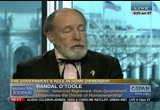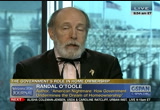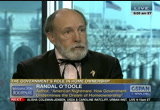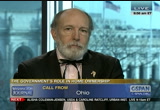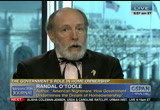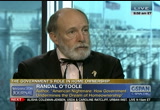tv Washington Journal CSPAN December 28, 2012 7:00am-9:00am EST
7:00 am
-- and hunger. host: good morning. as the deadline looms over the fiscal cliff, the attention is shifting to the other end of pennsylvania avenue. the lines of communication remain open. it is friday, december 28. the senate is in session today. stock futures are down in anticipation of what will happen next with the deadline, january 1. we will begin with your comments
7:01 am
7:02 am
7:03 am
ever. the president summoning congressional leaders. we expect there will be a stakeout afterward. we may hear from the president and we will be following all of that as the day unfolds. it's begin with david lightman. he covers capitol hill and the white house. the best sense of what you think the dynamics will be inside the room at the 3:00 p.m. meeting. guest: for all this talk of pessimism and optimism, the only people that know are the five principles in that room and i think that is important. they are all seasoned negotiators. they went to the debt ceiling stuff a year and a half ago. i think there will make an
7:04 am
honest effort to get this thing resolved. i am not as pessimistic as others. we have seen this go to the brink before. why would you give up anything until you have to is the old saw. you have to be braced for an anything. host: the president is getting higher taxes if we go over the cliff and he can go back and change the tax rate for those making $250,000 or less. the speaker saying it has to be $1 million or above. the president much more in the driver's seat. guest: yes and no. let's say we go over the cliff and that's the markets are in a panic and people have paychecks
7:05 am
that have less money in them. people will not necessarily blame john boehner. they will blame the president. he has political capital that could evaporate. i'm not sure if he gets what he wants -- that is not how american politics necessarily works. host: what led to this meeting? harry reid was sounding pessimistic early in the day. then john boehner calling the house back sunday evening with a vote scheduled after 6:00 p.m., setting up a late sunday session or a lot of fireworks on monday. guest: the redskins-cowboys game is on sunday night.
7:06 am
each side staked out a public position it had to stake out. use it at the end there's a sentence saying, but we will talk or negotiate. nothing unusual here to me. i think right now they are doing what they have to do publicly. we do not know what those people in the room at the white house are going to say and that is the key. host: the speaker will attend this meeting. he said the house has passed legislation to avert the fiscal cliff. now the senate must act. senator reid said it is up to the house. explain what is going on.
7:07 am
guest: i cannot read john boehner's mind. let's say the senate takes up something where you extend all the rates for a year but you increase the rates for people making $500,000. let's say that passes the senate. 75 votes. they sent it to the house. are republicans in the house going to be that obstinate if the senate sends that kind of signal? i do not think so. that is what a lot of us watch mitch mcconnell very closely. there are people in his caucus who early to vote for what i just said. can they get it on the floor and
7:08 am
overcome the procedural hurdles? host: if nothing happens, what are we looking at? guest: january 3 at noon. there are so many scenarios. if the new congress convenes on the third, negotiations continue. democrats would have more strength. they have gained 7 or eight seats. i think the key if they go over the cliff will be the financial markets. if the market go into a panic and if the dow tumbles into free-fall wednesday, thursday, friday, i think we'll see something quickly. host: david lightman, thank you for checking in.
7:09 am
we will check in with things stand with the fiscal cliff. you can join us honor twitter account at twitter.com/cspanwj. it is down to the wire. robert on the democrats line. caller: i blame the republicans . i do not think they are being honest. they think the american people are stupid. the american people are not stupid. the american people are not going to forget this. they know who is holding up the process. they may blame the president as well as congress. the american people have spoken.
7:10 am
they want the crisis solved. if you want to cut out all social programs, they are getting the benefit of the situation. this is what they wanted. . the american people do not want that. host: are you listening on c- span radio? caller: yes. host: good morning, jim. caller: i'm calling from georgetown, texas. senator schumer proposed a $1 million cut off. reid and durbin did not go along with that. no entitlement cuts and we have
7:11 am
$16 chilean debt and everybody -- $16 trillion debt and everybody keeps spending. don't we have to pay this debt down? host: the debt is $16.3 tr illion. another looming deadline. the treasury department can extend the deadline for the next month or two. part of the dynamics in the negotiations. front page of "the washington times." is the brink" cutline.
7:12 am
host: harry reid had this to say on the senate floor. [video clip] >> the american people do not understand. the house is operating without the house of representatives. it is being operated with a dictatorship by the speaker. if the $250,000 would be brought would pass. speed brainer could've brought legislation to the house and it would have passed. host: gcomments by harry reid.
7:13 am
the senate is in session today. bill has this point -- from "the national journal" -- the story is available online. "the president will have a strong hand to play over what to do about the tax hikes and spending cuts about to hit the economy. to allow the bush-era tax cuts to lapse for the wealthiest of americans. good morning, clyde. caller: good morning. political capital. neither harry reid nor the president will be running for election.
7:14 am
everybody else is pretty much locked in whether we go over the cliff or not. is it thelma and louuisuise or laverne and shirley? they all place their bets a year-and-a-half ago. the election decided it. host: thank you for the call. bill has this point. we are down to the wire in terms of negotiations. jackie is joining us from georgia. caller: good morning. i cannot believe i got through. i have been trying for so long.
7:15 am
host: thank you for being persistent. caller: the guy from the newspaper is wrong. we are not stupid. we know what is going on. i am 71 years old. i'm so worried about going down and being a third-world country. john boehner has to get his act together. he is not worried about anything. and the tea party -- give me a break. they are not worried about anything but taking us down. i still cannot believe i got to talk to you guys. thank you for listening. if obama could run again, i would vote for him again.
7:16 am
he wants to do something. the republicans do not. if a republican was in the white house, there would not be any worry about paying for sandy, unemployment, paying for three wars. there would not be anything to worry about if the republican was in office. they want to spend every dime they can. host: jackie from georgia, thank you for the call. this is from our twitter page. t's go to the jump page -- let's go to the jump page for a story in "the washington post."
7:17 am
7:18 am
july 25. it did not originate in the house. it has no chance of becoming law. that is what i said back on july 25. we allow that vote and i said we knew it did not pass constitutional muster and that democrats would proceed to a revenue bill that originated in the house as the constitution requires if they were serious and as i called on them to do last week. the so-called senate bill is no more than a glorified sense of the senate revolution. let's put that talking point aside. host: mitch mcconnell -- or is a story from politico.com, "why
7:19 am
they will not go over the cliff." "they see an advantage in negotiating with republicans that will feel free not to raise taxes once the rates have gone out. the president is pulling in the mid 50's. there is still time for the dynamic to shift. speed banner will stress the house has passed legislation to avert the entire fiscal cliff. there is an ad we want to point out in "the new york times" and "the washington post." together" rds "come as a way to send a message to
7:20 am
congress. "the struggle of today is for a vast future also." the words of abraham lincoln. jim from georgia on the republican line. caller: thank you. the senate has not passed a budget bill in the past three years. does that affect the fiscal cliff? host: more than four years? caller: does that affect our physical cliff? host: that is a larger issue of taxes and spending cuts. caller: thank you. host: bob on the independent line from florida. caller: nobody should worry
7:21 am
about the fiscal cliff. asey have everybody's ira's hostage. ira will have to buy ies.sur they are not worried about the budget. everybody that has an ira basically it will have nothing because interest rates will go up so high on the treasury bills in the coming decade. be heldy's ira will hostage. i took money and i put it into gold. i did not pay any taxes on it. possession is 9/10 of the law.
7:22 am
7:23 am
host: that will happen in january 1 if congress fails to reach a compromise, even a short-term compromise. dan on the phone from massachusetts. caller: thank you for taking my call. i would like to know how many millionaires there are in this country versus the number of people who make $250,000 and less. i think that's where the argument can bw won e won. john boehner is making a calculation and i think that is a poor population. we should roll back the reagan tax cuts. tax cuts do not work. the bush tax cuts have been designed to be temporary.
7:24 am
7:25 am
he ran against scott brown and loss. congressman stephen lynch. name out of contention is ted kennedy, jr. he will not seek the seat. he was speculated to seek the seat of his late father. the decision to buck the dying inouye. senator daniel in a the swearing-in took place yesterday with joe biden. brian schatz becomes the senior senator with the new congress being formed on january the third.
7:26 am
on the independent line -- jack on the independent line. caller: good morning. i bet a co-worker that we are going over the fiscal cliff. it is more of a slope than a cliff. it would be a year of complete in activity before we would see the real bite of everything, all of the doom that is being forecasted. i am reminded of erskine bowles and alan simpson. about three weeks ago or four weeks ago, they met with the president and members of congress and discuss their feelings afterwards with the press. erskine bowles said he felt there was a third of a chance that there would be a deal and a
7:27 am
third of a chance no deal and a third there would be no deal until after we went past the january 1 deadline. i bet my co-worker the $5 that we were going over because i am thinking if you cannot get a deal for to the house on $1 million and above, to the tax policy center released a report about that about three weeks ago. they said this was something that the president could perhaps give the republicans to save face on. the real big money is between $1 million and $10 million and above. if they cannot get that through, i have a feeling we are going over. i could win the first that i
7:28 am
7:29 am
action by congress. this is from "the new york times." there was a sharper than expected dip. host: back to your calls. fred from miami, democrat's line as the fiscal cliff talks head down to the wire. caller: good morning, sir, and good morning to everybody. i do not think --is going to work for the less fortunate. by doing so, i think it will be more pronounced, the line
7:30 am
between rich and for. you are the beneficiary of the system and do not care about the program. the social program -- [indiscernible] i have time. everybody has to come to an argument -- if we love america, we have to make sure everybody is [indiscernible] in the system where everybody has the certain well-being. i think this is a time -- host: fred from miami.
7:31 am
7:32 am
host: jay from florida on the independent line. caller: good morning. thank you for c-span. i think it is all political. i think they will come up with a deal. we had two wars. we have never seen tax breaks like this. we have to increase tax to pay off the war. we had hurricane sandy and now people want guards in school. they will have a deal.
7:33 am
if it goes over the fiscal cliff, it will hurt the republicans more. host: thank you for the call. a photograph of the president, cutting short his vacation. leaders were blaming each other for the stalled negotiations just days before tax increases lock in. more from the floor of the senate yesterday, harry reid. [video clip] >> speaker boehner should not have that members go back. they are not here. they are not here. john bennett seems to keep more about keeping his speakership than keeping the nation on firm financial footing. he is waiting until january 3 to
7:34 am
get reelected as speaker. he has so many people over there that will not follow what he wants. that is obvious from the debacle that took place last week. host: back to your calls and comments. negotiations resumed at 3:00 p.m. this afternoon at the white house. north carolina on the republican line, good morning. caller: how are you/ i'm doing well -- how are you? the budget as far as the epa, i wonder if that would help cutting the budget, plus cutting entitlement spending. instead of raising taxes and
7:35 am
lower deduction, i think we should cut the budgets of some of these offices and stuff. i think that might help also. host: ok. thank you for the call. this is "the wall street journal." big deals of the past have not worked out very well, especially for them, he points out. host: we are asking you to respond what happens next and how the fiscal cliff may impact you personally. good morning. caller: good morning. i have heard people talk about
7:36 am
the fiscal cliff. i knew the day after the election we have to go over the cliff. republicans forget one thing. democrats won the election. ain't this kind of backwards? what the republicans are proposing is not acceptable. host: this comes from our twitter page. the conversation, twitter.com/cspanwj. the headline in "the washington post.' " wayne from alabama. caller: good morning. we're here because the democrats. the democrats signed the bill
7:37 am
that put this into action a year ago. it sounds like a two-thirds majority vote of democrats and republicans. everybody wants to point the finger at republicans. do not want to change. it is kind of strange. i think the democrats are getting what they want. they are getting tax increases. the questions are posed here. c-span files in line with what the democrats want. you are asking what we would give up. you are asking the givers. this is all politics. the democrats wanted this. they pass the bush-era tax cuts.
7:38 am
if we go over the physical cliff, it is because democrats want us to. they do not care whether we go over the cliff. so live with it, guys. host: waye, thank you for the wayne.-wa- the obituary of norman schwarzkopf. the obituary from "the washington post." he became a familiar figure addressing reporters in his desert fatigues. he spoke in plain english.
7:39 am
7:40 am
cliff. now down to the wire. caller: washington, d.c., the belly of the beast. we have a $16 trillion deficit right now. we have the deficit because of social security, medicaid, medicare, welfare, food stamps -- all policies put into effect by the democratic party. everything is socialism. thomas jefferson said it best -- the republic is doomed. people sacrifice -- i'm a libertarian. i am more objective.
7:41 am
i'm not a republican or democrats. i have to wonder if i want to live in this country. 29% of americans got some kind of assistance when ronald reagan was president. i have to consider and i'm considering moving to a tropical island and watching america go down the drain. we need to abolish social security, medicare, and medicaid. host: i will stop you there. we appreciate your thoughts. joseph says -- will go back to stay but by the president on the passing of
7:42 am
7:43 am
when the president and everybody was running. the church was all over the program. we're in the church. do you know what happened? when we fall, china rise. open your eyes. let god come in to our life. we cannot live by the gun, money, and power. thank you very much. host: thank you for the call. and exclusive about every clan that she'll be back to work next week. she will return after three weeks of recovery after a stomach virus. she can move forward with their plan to testify in open
7:44 am
hearings on the attacks in benghazi, testimony she was not ine to give earlier december. she will be back at the state department. she has been recuperating. next call from trenton, new jersey. our next call. caller: i voted republican but i have at one of independent the points. it seems we have a logjam in washington over this voting on the fiscal cliff. the log jam seems to be on the democrat side. they should try to place the
7:45 am
blame on republicans. harry reid can talk about mr. boehner. he sat over there for three years and has not passed a bill on his side of the aisle. i feel there is an imbalance in the thinking of the people of this country. if we do not get her mind straits, we're in for some deep problems. i am a conservative by nature. the culture and liberal left wing is running this country -- the ulta and liberal and left- wing is running this country. host: thank you for the call. 44% of voters think congressional republicans are to blame. 15% blame both sides equally.
7:46 am
a lot of focus in new york. funding for hurricane sandy relief efforts totaling $60 billion. it is unlikely to be in the house. many are saying it is too expensive. "lock them up until they deal." we will continue our conversation on the fiscal cliff. damian paletta will be joining us from "the wall street journal" as negotiations resumed at 3:00 p.m. today at the white house. later, randal o'toole with the cato institute. he has a new book and will be joining us at 8:30. "washington journal" continues on this friday morning. we're back in a moment.
7:47 am
[video clip] >> there are cynics who say that a party platform is something that no one bothers to read and it does not very often amount to much. whether it is different this time than it has ever been before, i believe the republican party has a platform that is a banner of bold, unmistakable colors with no pale pastel shades. [cheers and applause] >> the 1976 campaign is interesting because you see the evolution of reagan, his mind, his philosophy as a politician. he talks in this speech about hope and about the future and a future without nuclear weapons and an america free without nuclear weapons being aimed at them but it's a more progressive, it's a more optimistic view of the world than, say, 1976. it is not just a denunciation of big government liberalism or
7:48 am
big government programs. you can see his anti-communism is evolving, his cultural view is evolving. he has not yet gained or acquired the tax-cut philosophy which fit so nicely into his optimistic outlook of empowering individuals to determine their own lives. >> saturday night at 8:00 eastern, craig shirley on the political campaigns of ronald reagan, part of four days of american history tv, right through new year's day, on c- span3. >> you think of washington before the civil war. you think slavery was well entrenched. black people were miserable. that is not true at all.
7:49 am
in washington, washington had about 30,000 people as a city. 12,000 of them were black. the majority free, no slaves. >> what led to the first race riots? jefferson morley recounts what happened, part of what today's through new year's day on c- span2's book tv. >> "washington journal" continues. host: damian paletta join us here at the table. thank you for joining us. this is the fourth time that congress has had a post- christmas lame duck session. what does that tell you about
7:50 am
the magnitude of the issues? guest: it is not like an issue us.'s snuck up on expiring tax cuts, payroll tax cuts is going away. all these things have been out there for a long time. some of this was put off because of the election. they have to get some kind of deal to avert what can be a messy beginning of the new year. host: any deal is likely to be limited. guest: we have heard about the talks between president obama and john boehner. a grand deal that would include some changes to social security, medicare, cuts in defense spending potentially as well. talking $4 trillion -- we are
7:51 am
talking $4 trillion in 10 years. they have to come back in 2013 and talked about changes to social security, medicare and address the debt ceiling. host: we have some comments from our facebook page. they reflect the frustration we are seeing. guest: after the election, we heard the president and top republicans say the election is behind us and we can get down to do in the country's business.
7:52 am
they both pledged by partisanship. that evaporated within days. everyone is back in their corner blaming the other side and not making much progress at all. business is retrenching. families are holding back on spending. host: why is compromise so difficult? guest: the with the primary system works has carved out the bit.e kila little they get blown back much more quickly on ideas. they are both afraid of the outer wings of their party. it seems compromise is hard to reach. host: we are keeping our eyes on the stock market.
7:53 am
the dow jones is down a little bit. headline from "the wall street journal." what impact does this have on the economy? of it.ceo's stayed out they larger left politicians to deal with it. that ended up being a catastrophe. this time they wanted to be more involved. "cut a deal and we will support you." that seems to love gone nowhere. -- that seems to have gone nowhere. especially if the stock market starts to fall. a lot of frustration on their end.
7:54 am
host: we here is more of a slope than a cliff -- we hear it is more of a slope than a cliff. guest: the federal agencies are likely to see their budgets cut, depending whether it the pentagon or other agencies. the agencies can try to shield some programs for others. social security benefits are not going to be cut. the pay for pentagon officials is not going to be cut. if this drags on into march or april, they will have to do furloughs, is essentially giving people vacations. host: the headline from "the wall street journal." is that one way to do that? guest: that is a painful way to
7:55 am
do that. when people do not have money to spend, the economy is not going to grow. if this goes on for a couple of days and the stock market falls dramatically, congress and the white house may be able to avoid some of the long-term consequences. if everybody digs end, more disasters things could take hold. host: the president, vice president, speaker of the house, democratic leader of the house, will be meeting today. from the reporting you have done, what will be happening? guest: they could sit down and cut a deal in five minutes. they know all the issues. they know where their parties
7:56 am
are. they could sit down in five minutes, shaking hands, and cut a deal. i do not think that will happen. o no dwant to be seen as the party that is caving in. i think they will say, "it is your turn to move." it's hard to tell what will happen. host: 4:00 p.m. on friday afternoon. we may hear from the president later today. if talks break down, does the house need to come back on sunday? guest: i do not think the house can afford not to be here. they have to try to look to make the public think they are trying
7:57 am
to help. we referred all lot of talk about who's the winner if we go over the fiscal cliff? there is no winner. it will be a mess the white house for sure. he has to deal with this for several weeks. the republicans have their own issue to deal with. it will be hard to put the genie back into the bottle. things could get ugly quickly. host: back to your earlier point. bill has this point. guest: that is true. this situation has never
7:58 am
happened before. the republicans want a 10% reduction for the federal employees. will the government pay them? we do not know that. we know that everything is on the table. maybe federal workers will not want to come back and look for other lines of work. host: a the work is asking a question -- a viewer is asking a question. guest: plan b last week was a bad moment for them. the president does not need to bother negotiating with john boehner. that set the whole process back.
7:59 am
i do not see how the white house gains from this. families and businesses will be urt. he doesn't need another few months or years of a bad economy. that is a good question. we have to wait and see what happens. if you have a couple hundred dollars more taken out of your paycheck, that is going to hurt. so your investments -- also your investments, if they start to go south. those are the things that can hurt families. host: this from another viewer. you can join the conversation.
8:00 am
antoinette from louisiana. good morning. caller: good morning. i have a few things i have to say, because i am very dissatisfied. i don't think the way they are treating the president is right. first, what he said four years ago, whatever plan he had then is over with. this is a new election. the deal that he had a year ago, that does not count. for republicans and people to say they don't understand what's going on, i have a problem with that. the republicans deny anything he puts forward. the president-elect is vacation and came here.
8:01 am
they're not being fair. republicans say they are christians. they're not. they did this during his last term and now are calling -cause- and all of us to suffer because they don't like the president. this is personal. this has nothing to do with raising taxes. this is a personal attack and i think it's a shame. we look like a third world country. we don't look like the united states. host: let's get a republican voice. our next caller is calling from west bloomfield, michigan, on the republican line. good morning. caller: i would like to get your thoughts on a balanced approach and have unbiased taxation by using a flat tax. that way you can calculate the amount of taxes we need for the deficit over 10 years.
8:02 am
another point is to control the spending on entitlements by not giving millionaires social security benefits, thereby satisfying president obama's approach. instead of doing it through taxation, he can do it through the entitlements. guest: those are both ideas that have been raised, especially the social security and medicare benefits for the wealthy and potentially might not need them to live off of. one tricky part of that is wealthier americans have been paying these taxes for decades into social security and medicare if and a lot of folks have a problem with the idea of taking away their benefits they have paid for if just because they happen to be more well off. and issued the first caller raised and something to watch is this could really sort of set the tone for the president's second term. if this thing gets ugly and stays ugly, it's probably going
8:03 am
to stay that way at least another year or two expand the next thing you know, he's a lame duck president. if we cut a deal and move on and he brings congress with him, we will see a new political atmosphere in washington. at this point it seems like more of the same. host: from facebook -- guest: one thing i a lot about yesterday was this is really raising the question of canada to be cut? is it politically possible in this environment to get enough republicans and democrats to support a deal that the white house wants on deficit reduction? because they been to the altar so many times on this same issue, taxes, medicare, social security, defense spending, you must wonder, if there's any agreement possible. host: first, commented today
8:04 am
from the senate republican leader mitch mcconnell, who will join his colleagues later today at the white house. [video clip] >> i told the president last night we would be happy to look at whatever he proposes. the truth is we are coming up against a hard deadline. as i said, this is a conversation we should have had months ago. republicans are not about to write a blank check or anything senate democrats before or just because we find ourselves at the edge of the cliff. that would not be fair to the american people. that said, we will see what the president has to propose. members on both sides will review it. then we will decide how best to proceed. hopefully, there's still time for an agreement of some kind that saves the taxpayers from a preventable economic crisis.
8:05 am
host: damian paletta. guest: senator mcconnell is a pro at this kind of negotiation. he's going into this white house meeting saying, give us your proposal, let us see what you want to do, we will be willing to look at whatever you present. the potential problem is what the white house will present is something they are presented before that senator mcconnell has said no to. either the white house will get more creative so that they will have something host: they can look at this photograph of the democratic leader harry reid in the "new york times, returning to the u.s. capitol. his shadow. what's the relationship between harry reid and mitch mcconnell? guest: it's hard to tell. the rhetoric on the senate floor can be pretty tough. they call each other my dear friend whenever you want them on the c-span channels, but i think
8:06 am
they both are in a frustrating position. senator harry reid does not have more than 60 members, so we cannot block a filibuster but senator mcconnell is adept at applying in cases where he'd want to block legislation. but i think they both have respect for each other's legislative skills and they have proven in the past that when they need to cut a deal, but can cut a deal and bring their party's members with them. host: john mccain writes a big budget deal is still worth doing. he points out to the history of some of these agreements, most notably with ronald reagan in the 1980's and president bush in 1991 in which republicans agreed to spending cuts that never happened while raising taxes. guest: that's right. there's a little confusion about how much spending cuts happened. it's the same sort of formula both sides are pursuing this time. you lock in the tax increases on the front end. then you come back later, six
8:07 am
months, nine months, 12 months and find spending cuts in defense programs and set them into law. if you're among republicans is if you reach an agreement now and agree to tax increases, the spending cuts will get undone or never will be followed through on. that's one of the things that has held back talks, because republicans are skeptical that democrats will follow through. host: charles is on the independent line from colorado. caller: good morning, steve. i listened to it the myopic dogma in this segment over and over. the only people i can blame on this are the american people. the people who sit here and listen to these guys that are extremists and and they vote him into office -- them into office. i hear people say let's get rid of epa.
8:08 am
if you look at how much epa takes out of our budget, that's like worrying about nothing gary people need to turn off the tv and start studying more. crack some books. look at economic spirit trickle- down economics does not work. name a country where it has worked? maybe estonia. but it's not working incr greece. i heard a great saying that says when time gets tough, everyone is a keynesian. turn off the tv. not c-span of course. but turn off the news channels that are just cramming this stuff, and get involved in this before you formulate an opinion. i think we would be voted into
8:09 am
office smarter, better people that are not tea party extremists. how about if on the democratic side grover norquist had said never cut any spending? i'm going to sign a bill that says never cut and spending. grover norquist, here's a great example, he does not even believe in economic case multipliers. host: gary says -- guest: what's interesting about the last election cycles is we had under president bush and the end, democrats seized control of congress in big numbers. and we had the big democratic sweep with the white house in 2008. 2010, republicans came sweeping back. we've had a pendulum swing, very contractive time period. that's one of the factors.
8:10 am
we have seen both sides really dug in because they don't know where the pendulum will swing in the next direction. host: from one of our viewers -- on facebook -- guest: that's right. one of the points she raises is it's easy to look and collectors and say we will just drop 10% of this program and 20% off that program. but when you get down to the individual programs, we're talking state and local police departments, fire departments, teachers' pay, all sorts of programs that have different constituencies that you would feel the impact of some of these cuts. doug a.s. said isn
8:11 am
we need to look a programs and decide what we need from there. it has been more looking at the bigger picture. host: what led to the fiscal cliff? guest: the fiscal cliff is the combination of a bunch of different tax and spending decisions made by washington, dating back over the past 12 years. we had the bush tax cuts that began in 2001 and 2003. we extended them under president obama. those are set to end on monday. $110 billion in annual spending cuts were agreed to under president obama as part of the debt ceiling negotiation. those begin on tuesday. we have the payroll tax cut in place for two years, takes about two percentage points off people's taxes, bill will end on monday. business tax breaks, bill will end on monday. the alternative minimum tax, which is confusing, but it would be a disaster if that was not taken care of, because it would
8:12 am
raise the taxes of about 30 million americans for their 2012 income and 2013. and all the confusion could screw up the whole tax filing season. who knows when you will be filing your taxes, because the irs does not know which tax rates will be applied and who will be responsible for paying what. so it's going to be a mess if this is not handled quickly. host: if we are sitting here a month from now after the inauguration and there's still no final agreement on taxes, could that the label 15 -- guest: no doubt about it. secretary dieter even said that a few days ago. --secretary tim geithner. it could delay the tax filings. the government relies on august revenue to come in and it usually comes flooding in during march and april. people need to pay their taxes,
8:13 am
but they don't know which tax rules will apply. host: the other deadline is the debt limit. $16.4 trillion.3 guest: >> the treasury department can stop funding federal pensions and do some other maneuvers, essentially to buy them another six weeks of time. we all at this last year. closer they get to that is when financial markets will start going crazy. the debates we are having now about tax and spending will likely be the same debates we are having six weeks from now. host: there's the u.s. debt clock. you can also see how much that is for individuals and what protection is moving ahead. our guest is damian paletta of the wall street journal. the covers finances and congress and the white house. his work is available online. from the senate floor yesterday,
8:14 am
these comments by the senate democratic leader harry reid. [video clip] >> the speakership all members of the house back to washington today. he should not give let them go. they are not here. they are not here. john boehner seems to care more about keeping his speakership than about keeping the nation on sound financial footing. it's obvious what's going on around here. he is waiting until january 3 to get reelected as speaker before we get serious with the negotiations, because he has so many people over there that will not follow what he wants. that's obvious from the debacle that took place last week's. host: referring to the vote oesterday on speaker b ehner's plan b. guest: they might feel they have better numbers in the house than they do now later.
8:15 am
he would be able may be to push a plan through without as much republican support. i doubt it. it would be really risky move and then we are in early january without a deal still. host: that's what you wrote in the washington journal this morning -- the wall street journal. republicans participating in a conference call yesterday said -- guest: that's right. the republicans feel like if they wait this out, they might have a clean slate on the taxes to work with. it would not be accused of increasing taxes if taxes have already gone up on their own.
8:16 am
maybe republicans might be more willing to accept some tax increases then. host: our topic is the fiscal cliff as the deadline looms. we welcome our radio audience on excedrin channel 119. there's a meeting at 3:00 this afternoon at the white house and we will have cameras outside the west wing if the principles come out to speak. -- on xm channel 119. guest: i don't think this is the perfect dupe. if they can drag the meeting out for an hour, connect markets will close at 4:00 on friday. asian markets don't open until sunday. we will have a situation where they will speak to the microphone and the economy will
8:17 am
not collapse, nor will be asian market. host: is that one of the reasons for the late time of the meeting? guest: they would not back to worry about the financial market reaction and maybe get down to business. host: the president has his own private plane. guest: he's done it before. host: angeles joining us on the democratic line for maryland. caller: good morning. i have a story i would like to see the washington journal do or basically any media outlets in relation to. the to if the tea party is called the taxed enough party, why would they not protest like they did with obamacare? where is all the protest in front of the capital if they are so big on texas? we are three days away from getting taxes raised. guest: we have seen a couple stories in recent days about the tea party influence in these talks or lack of influencing the talks.
8:18 am
trickys one of those tissue issues. a conversation is all about the deficit. the problem is how aggressive will they go after the deficit and what mix of spending cuts and tax increases will be part of the negotiations? it is a wait-and-see approach. whatever decision is made will annoy some interest groups, whether it aid charities or the housing industry or teachers, but the party. we will see some swift reaction. at this point, it's hard to know what to protest, because the deal is in flux and has fallen apart so many times. host: let another scenario on the table. a recent agreement on the fiscal cliff, another big issue will be raising the debt limit their there's also the issue of immigration,, the president wants to bring up in his state of the union. and the issue of maybe an assault weapon ban that could, and congress. some big ticket items. how important is it for the
8:19 am
white house to get this out of the way? guest: incredibly. the president told second term hinges on getting this address and put aside because he cannot keep coming back every six months to deal with brinksmanship about federal spending. it's not like they can come back in the year. these things have to be addressed. late march, we could have another government shutdown because the government spending bill lapses on march 27. we cannot be in a situation where we keep coming back and dealing with this. if not everything else off the desk and consumes a ton of time and erodes the relationship with congress in the meantime. host: a tweet -- guest: i might disagree with that.
8:20 am
although there's an argument to be made up the closed door talks don't work. in 2011 there was a lot of closed door conversation on the hill and at the white house between the speaker and president obama. they got to the edge and almost had a handshake deal and did not end up falling through. a similar situation this time, a lot of. closed door of a lot of party leaders feel it's impossible to have conversations in the open in negotiations because they would just get the blowback immediately from different interest groups. there's also a lot of lawmakers in both parties that children need to be more transparency so the public can know with their elected officials are doing. host: damien is joining us on the republican line from louisville, ky. caller: good morning. host: i want to ask you about the republican leader from your own state, mitch mcconnell, and his role in these negotiations. how is he doing as a republican? caller: is doing pretty good.
8:21 am
host: go ahead with your comment. caller: i really don't see much on the fiscal cliff. if they make a deal, either way they go, it will hurt. by the time 2014 gets here and when obamacare kicks in, it will cost me so much that i will have to quit work. it will be worth more for me to be on welfare than to keep working and just working for nothing but health care. host: we will get a response. guest: this is something a lot of people are waiting to see what the impact of that law is going to have. a lot of that, the major provisions don't kick in until now and in the next few years. everyone will wait to see what the impact on the economy will be. there's a big disagreement about what will happen. host: this new york times piece gives a sense of the mood in washington. let's read the first paragraph
8:22 am
or two. guest: this is only the fourth time since the 1930's they have had to come back after christmas to do work. this is uncharted territory. no one really wanted to be in a situation, but it was a factor of them having to wait until after the election to start negotiating these things and then they did not have the time they needed. the process proved too cumbersome with democrats going one way and republicans going and ever. it was not the cohesiveness we expected. host: the house coming back
8:23 am
sunday night for votes just in time day redskins versus cowboys games will happen. guest: i'm sure they would hope to have a debate and vote on quickly so they can get out of fear. they cannot be illustration where they are not here if we go sailing off the fiscal cliff. they cannot be back in their districts campaigning or fund- raising. host: our next call is charles from california, on the democratic line. you are on with damian paletta of the wall street journal. caller: why in the world the we keep arguing about the fiscal cliff, because i know in my heart that the republicans are stopping this. there's no one else. we are still sitting here fighting and the republicans are still fighting him. guest: he raises a point a lot of democrats agree with. you talk to republicans and they say it's the democrats' fault. why can't the president give us
8:24 am
a proposal we can vote on, they ask. each party believes they are right and the other side is wrong. that's why we are here a couple days before new year's wondering what policy makers will do at the white house meeting today. host: scott is from colorado springs on the republican line. good morning. caller: good morning. a couple things. i get tired of hearing obama was campaigning about we need to get a hold on spending. yet he comes back around with a $1.2 trillion budget. the other thing is harry reid has not voted on over 40 bills the republicans and put up there. he blames the republicans. i stopped you were supposed to bring bills up there and talk about them and vote on them. they have not passed a budget in
8:25 am
over four years. why are they not being held responsible for that? guest: i think that's the beauty of being senate majority leader is you get to decide what comes to the floor and what does not. that's what makes him such a powerful figure. it's a complaint with your often from republican leaders in the house is the senate legislation that would help the deficit, in their view, would create more jobs, and the democrats incentive not acted. the democrats in the senate say they are partisan bills that don't have democratic support and we disagree with what their impact would be, so we are not going to vote on them. that's why the majority leader harry reid -- or senate leader harry reid will be at the white house today, because he is vital to them getting any agreement. host: the headline from the washington post this morning -- and in "usa today" --
8:26 am
and from the new york times -- guest: in 2011 in the debt limit fight, financial markets tune it out mostly until the very end. that's when things got volatile. volatile dramatics we saw a huge 300 to 400 point swings on a daily basis. today's proceedings the agreement ends a week afterwards when they had a downgrade of the u.s. debt rating by standard and poor's. we had a slow erosion the last four days. things could get really volatile next week if ben austen this situation. host: cliff talks down to the wire. guest: that's right. majority leader harry reid yesterday said we might not even have time to get a deal even if we reach an agreement, just
8:27 am
because of the mechanics of the house and senate and how long it takes to pass legislation. i think if they get a deal, they can somehow get it through. there's no room for error. if they come out of the meeting at the white house today and everyone shrugged their shoulders and says there's no way we can do this, that sends a signal to the american people that we are going over the cliff. you think?doe guest: we're going over the cliff probably. republicans are so dug in on this issue. they got into the house and senate based on their views on taxes, medicare, social security. it is hard to imagine in the next three days they will have some huge concession and reversed the views they have held 20, 30, 40 years. at the same token, maybe they will say what will happen to the economy is so damaging that i have to compromise my position, and that will require me to back off my positions i've held a long time.
8:28 am
host: if the speaker is able to convince a handful of republicans and democrats will convince house republicans, they have a majority. guest: that's right. then you would not have the question of how long the speaker will be the speaker if he requires a ton of democrats the presid -- a ton of democrats to support the president's proposal. we will have to see whether both sides decide to put country before party or whether they feel their position really is the right position and the best course of action for this country. they will have to make that decision in the next 12 hours. host: roger in des moines, iowa, independent line. caller: good morning. i've got a question. i am just questioning the arithmetic's. i am a conservative, but i am independent. would somebody take a pencil?
8:29 am
the bush tax cuts is about $500 billion a year, i am hearing. the tax breaks that the rich get, it's $85 billion. the bush tax cuts that the president has been bragging about that only for the rich, $450 billion a year is to the middle class and lower middle class people. so, if everybody says let's go back to the clinton tax rates, that is the clinton tax rates. also, on more spending, the iraq war, we pulled the people out. on c-span about two months ago i turned it on a senate armed
8:30 am
services committee. i've not seen any by a report on this. the. -- the state department said in private contractors at a cost it at or > if we would've sent our troops in there. it is a fact right now, the figures don't lie, but liars figure. host: thanks for the call. guest: the president's proposal to roll back the bush tax rates for upper-income americans would raise probably about $100 billion a year. that includes higher tax rates on itincome earned over $250,00, higher estate taxes, and more. it's not going to solve our deficit problem, but it will have an impact. the question is, is that
8:31 am
enough, too much, too little, when you combine it with spending cuts, to reduce the deficit to more stable level over the years? host: what we have seen in these negotiations between the principals, how does that portend in terms of what we will see in the next congress? guest: it's hard to tell. this tax and spending stuff is such a dna part of both parties. they have been fighting about this. the clinton administration, the bush administration, the reagan administration, and they've been fighting about the same issues for years. gun control is harder to tell. the national mood on that is much different. immigration, i think, both parties can learn some lessons from the election. that egg has been scrambled a little prevent will be an interesting debate to watch. this fiscal debate continues, we deal with the debt ceiling, the
8:32 am
potential government shutdown, for all these issues dragon to 2013, it will lead over into a lot of these other issues as well and will challenge the president in his second term on how he can handle congress. host: let me restate the comments that you said earlier, "we are at the 11th-hour." guest: that's right. they have thrown a hail mary pass and the clock is running out. will we catch the ball or will we go over the cliff is the question. host: thanks for being with us, damian paletta. guest: my pleasure. host: we will be following the talks and we have a web site. we will have live coverage on this network and on c-span radio during the day. coming up in a couple minutes we will turn our attention to home ownership with randal o'toole of the cato institute, to talk about his new book, "government nightmare." later, it's friday.
8:33 am
america by the numbers. today we put a spotlight on food and how much damage in this country continue to struggle with one of the basic necessities of life. the "washington journal" continues. for this friday, december 28. we are back in a moment. >> ♪ [video clip] >> we really started to get worried in the summer and fall of 1774. the british admiral and the generals and diplomats were reporting to the crown the colonists were sending ships everywhere to try to get ammunition, muskets and cannons. this was after the british had sent more troops to boston after the boston tea party and the coercive acts. it's clear the colonists were pulling together ammunition and cannons. maybe they did not intend to use
8:34 am
them. that was a big debate. there was a council on october 1774 basically protecting british ships from taking ammunition and everything to the colonies unless it was officially sanctioned. so they were very alert to this. as soon as the colony's found out about the order in council permitting an emissions from being sent to the colonies, in new hampshire and rhode island, colonist patriot militia took over the forces and took the ammunition and canons they could get. everybody knew what was coming in the winter of 1774/75. >> sunday night at 8:00 on c- span. [video clip] >> i like the congressional
8:35 am
hearings and the stuff about the educational stuff, all the policy-making situations. thatnk it's a great thing washington d.c. has all these things and c-span covers it. >> eric want to c-span on comcast. created by america's cable companies in 1979, run to you as a public-service by your television provider. >> "washington journal" continues. host: randal o'toole is a senior fellow at the cato institute in washington and is the author of this book on how government undermines the dream of home ownership. thanks for being with us. >> good morning. glad to be here. host: how does the government affect homeowners buying a home? guest: 45% of american housing
8:36 am
is in states and urban areas that have severe land-use restrictions, urban growth boundaries to prevent urban sprawl. they have other kinds of restrictions such as onerous permitting processes that it takes up to five years to get a permit to build up to one house. that makes it very hard for builders to meet demand for housing. when that happens, housing prices become very expensive. homeownership rates dropped. the federal government has long had a policy of promoting home ownership. we have various subsidies for home ownership, but ironically, when the federal subsidies for home ownership collide with the state and local restrictions on home ownership, you end up with higher housing prices and lower home ownership rates. so the federal programs are doing more harm than good. the state programs are definitely doing more harm than good. we need to end this kind of undermining of home ownership. host: as of the late 1960's, in
8:37 am
the book, america's home ownership rate of more than 60% was one of the highest in the world. why the disparity? guest: since the 1960's, states like california and florida and most of the new england states have imposed huge land use restrictions and ownership is declining in many of those states. states like texas and georgia and north carolina at imposed those kind of restrictions, so they have higher homeownership rates. you look around the world and it's amazing to see the countries that we don't think of as well countries have much higher homeownership rates than we do. mexico has 84% homeownership compared with 65% year. brazil has 75%. lots of countries that we think
8:38 am
of as being less wealthy than we are have much higher homeownership rates. i think it's because of ownership is not a function of well. it's a function of government getting in the way or staying out of the way. host: the debate we are facing today and this weekend, issue of the fiscal cliff, one aspect of the debate is eliminating or reducing or changing the mortgage deduction on our tax filings every april. should congress? provide tax congress is that part of the problem you're right about in your book? guest: the tax breaks are supposed to assist some ownership. actually, they benefit mainly wealthy people. you have to pretty much to earn more than $55,000 per year. more than the median income, to be able to declare the tax break. the wealthy people who would already be buying a home anyway would get the tax break. i don't think it assists home ownership. it adds to% or 3% to home
8:39 am
ownership rates. if we get rid of the mortgage interest deduction. at the same time, the state and local areas that do land-use restrictions got rid of their land use restrictions, we would see much higher ho homeownership rates. host: what about second homes? guest: same thing. land-use restrictions are restricting second homes. if we had less land-use restrictions, we would see more second homes. host: back to the book -- guest: that's right. it is erroneous to say that we had a housing bubble. instead we had many housing bubbles. the housing bubble sat almost perfectly correlated with the state and local areas that have
8:40 am
land-use restrictions. california had a severe housing bubble because it has some of the strict land-use regulations in the country. texas had no housing bubble because it has almost no land- use restrictions. if you look around the country, if you took away those land-use restrictions in places like massachusetts and florida and california, we would not have an housing bubbles. we would not have had a housing mortgage crisis or a financial crisis. it was the land use restrictions that caused the bubbles that caused the financial crisis. host: the right about that in chapter 13 -- what's the parallel? guest: the tulip bubble, there was a limited number there was a limited number of bulbs, so they were
8:41 am
buying bulbs into the future. in california, demand went up because interest rates went down because of prime lenders started lending to low-income families. homhome builders were not able to meet the demand, prices went up. in texas, it takes as low as 120 days to get all the permits you need to build a house and moved in after you have bought the land. when demand went up, home construction went up and there was no increase in housing prices. host: now department housing and urban developed and it issued this statement --
8:42 am
your response? guest: the reality is private industry was already financing homes long before the federal government got into home finance. we had the building and loan association. now we call it savings and loan associations. it started in 18 80's. they enable people to buy enablewho previously had been unable to buy homes -- who had previously been unable to buy homes. in the late 18th century, homeownership rates were higher among blue-collar people than the middle class. the working class of home ownership as something that was valuable for their family and the middle class did not. the building and loan societies and through other techniques, a working-class was able to build high homeownership rates. and the so-called war on sprawl
8:43 am
and the zoning where efforts by the middle class to make war on the working class to reduce working-class home ownership rates, to keep the working-class out of their neighborhoods. so we have the federal government on one hand saying it's time to improve home ownership and we have urban planners and other middle-class people saying let's keep the working class out of our neighborhoods, let's keep them from owning homes. it went to a standstill. i home ownership is no higher years ago.it for you ar40 host: this from one of our viewers -- guest: the alternative minimum tax affects only the wealthiest people. i don't think anybody is not going to own a home because of the alternative minimum tax. the problem with the alternative minimum tax is it is affecting low end lower income brackets all the time, but it's not
8:44 am
necessarily affecting home ownership. this is like the mortgage interest deduction and alternative minimum tax can do is affect the size of the homes we buy. we might buy 4000 square foot home with the mortgage interest deduction instead of a 3500 square foot home. but it does not affect home ownership rates as we might expect. host: the book is entitled "government nightmare." our guest is randal o'toole. what are your recommendations? guest: the most important thing is for states to repeal the strict land-use restrictions. florida has led the way. last year florida repealed its 1985 growth management law that required cities regarding boundaries throughout the state. it would be great if california and new england states could do the same. if those states could act, we would no longer have a housing crisis. on the other hand, the obama administration wants to impose
8:45 am
land-use rules on all 400 major metropolitan areas in the country. the obama administration has its way, is a crisis will be twice as bad as the last one. host: our phone lines are open with randal o'toole. you can also send us an e-mail or join us on our twitter page or our facebook page. bob is on the republican line from greenville, south carolina. caller: good morning. 35% of the homes in las vegas are leading up to the bible were second homes. that was speculation by individual americans, the individual people. in many cases they were building up the bubble. a device thato wri blows my mind. in california people on home prices would never come down. a certain percentage of the people were to blame for the home bubble gum does like they were to blame for the tech
8:46 am
bubble. now they have loans attached to them and many walk away and then we have to print money from the federal reserve. how can you deny this did not happen? people just on home prices will go up forever and i will jump in and take a hold of this and then they go down and everybody wants to blame someone else. you don't see that at all happening in this equation? guest: in order for speculation to happen, you have to have rising prices in the first place. you did not the speculation taking place in texas or kansas or nebraska or north carolina, even though those areas were rapidly growing in the 200's. the reason you did not see it is there were no land-use restrictions to make house prices go up. in california if you had severe land-use restrictions come as a housing prices rose and speculators jumped into the market. in nevada, the federal government owns 90% of the land. if they started limiting land sales in the late 1990's.
8:47 am
so house prices started shooting upwards. so spectators jumped into the market. if you did not have land use restrictions, there would be no room for speculated. there would be no attraction to the spectators. the speculator is are more of a symptom of the problem than the problem itself. host: next caller is from michigan on the democratic line, becky. caller: i'm beginning i should think i ought to quit listening to c-span because i learn something new every day and my head is getting so full of stuff. host: we're glad you are learning something. we don't want your head to explode. caller: on this housing thing, i wonder if your guest -- if i could ask him a question on doing the re-- you know the government has made some of the banks change our loans.
8:48 am
for instance, my husband lost his 30-year job and the only other job he could get was minimum wage, which was one- third of his previous income. and we still kept up with our house pavements, believe it or not, but we spent $20 short for two months in a row and we have threatened to take the house. so we have filled out all this have them read do it. they said we qualified and sent us all this paperwork and everything. then we get this guy's name that we are supposed to go through. if we have any problems. everything was fine for about a month. and then they started calling again. come to find out, this is chase bank, and there's three different parts of the bank that are calling.
8:49 am
and none of them know what the other one is doing. this guy that was telling me they were going to foreclose on my house after david called the guy that is supposed to be in charge of everything, and he unsaid they have this letter and they're going to foreclose. we were a wreck. he says don't pay any attention to that. he said you are in this program now and that has nothing to do with anything. he said they have nothing to do with it anymore. host: thanks for the call. up putting some information from the home affordable modification program best available for any primary ho ome or rental units. guest: she said her husband does
8:50 am
have a job, although it's a lower income job than he had before. he probably qualifies. i sympathize with your plight. i am sure that everything will come out ok, because this program is in effect and is working for a lot of people. what concerns me is we would not have had the program in the first place. it is costing taxpayers some money. if we have not had the land use restrictions. this is something that so few analysts have looked at. a look at housing bubble and said it was caused by low interest rates or by some prime lending. but there was no housing bubble in texas or north carolina. it was because they deniable land-use restrictions. we really need to address the land-use restrictions. the time to do it is now when housing prices are low. chapter 15 says --
8:51 am
i put that on the table because many critics are going to say we need restrictions because it's not only in the homes, is the schools, infrastructure, bridges, roads, we cannot keep building and building without having in the structure to support it. guest: infrastructure is an overblown problem. we don't really have as serious an infrastructure crisis as people claim. we don't have a highway infrastructure crisis. we do have some highway funding problems, but they are considerably exaggerated. the real problem is that people do like to own their own homes. do like to have a house with a yard for their children and pets to play in and gardens. land-use planners, long, planners in my former hometown of portland, oregon, said a
8:52 am
target to reduce single-family home ownership to 41% of the region, and it's currently 65% of the region. if that's less than tokyo. 45% of the residents of tokyo live in single-family homes. we have planners saying they want to force people out of their homes, put them in high- density apartments and condominiums and things like that. that's hurting the american dream. host: jim is joining us on the phone from lorraine, ohio. calleindependent line. caller: i disagree with what your guest is saying. yesterday you had on their house prices have dropped 30%, 60%, in many of our major cities. the mess was caused by mortgage companies and banks and wall street and aig. the government bailed them out. how you can sit there and say
8:53 am
most of the problems are woodland restrictions -- are land restrictions with the mess we were in, it's ridiculous. guest: you only have to look in the data that are in my book or that you can download from a variety of web sites that shell housing prices have dropped tremendously in places like california and florida that have land use restrictions, it's a and not dropped hardly at all in places like texas, north carolina, georgia, but don't have land use restrictions. housing prices in houston, which has no zoning, are higher today than they were in 2008. so we don't see the kind of decline when you don't have the land use restrictions. the restrictions are a because the bubbles and that on caused a financial crisis. host: our guest is randal o'toole. marshall is joining us some inglewood, florida, democratic line. - marsha.ood mornin
8:54 am
caller: good morning. president obama is focused on we can do better. i do not hope that or dream that or wonder that. i believe that and i am not even worried. i wish people had less worry. thank you. guest: we have a variety of problems. i think most of our problems are institutional. i think people misperceive the problems. in the 1970's we had a big scare about urban sprawl gobbling up our farmlands. yet all the urban areas in the country only cover less than 3% of the land area of the united states. we have a billion acres of farmland and yet in 1985 the florida legislature passed a law that protect farmland from urban
8:55 am
sprawl. that law ended up causing a huge housing bubble that has not created a foreclosure crisis in florida. last year to repeal a bad law will help that from happening again. we can do better, obama is right. but we must understand the institutions that caused the problem and the problems. host: a tweet -- how do we strike a balance? you cannot just have homes. you have to have schools and sewer systems and other infrastructure to support the homes. and still need farmland. guest: more than a third of the country's farmland. we have a billion acres of farmland. we only grow crops on 400 million acres of it. about 40% of all of our farmlands. so there's lots of farmland. there's a huge surplus of farm land. we grow a crop surpluses can export that every year. there's no shortage of farms.
8:56 am
" there's a shortage of of, especially in places like california, where 95% of the people are confined to about 5% of the state because of urban growth boundaries, is a shortage of places to build homes. when you drive on in the interstate freeway, you might see a lot of urban sprawl. if you get off the interstate, and we have a tremendous amount of open space and forests and farms in this country, they're not in short supply. host: tom is joining us from ohio on our republican line with randal o'toole of the cato institute. good morning. are you there? caller: yes, i agree a lot with what your guest is saying. i have seen this for the last 40 years. i cannot understand it how would you go about -- you look at congress and the senate critic, with more regulations and
8:57 am
everything they, with, it's always six years later. people think it happens under that president or under that congressman or senator. i really believe if we want change in this country, we have to get the money out of politics. there's no reason we cannot bring them all on c-span and have them all. that way you can see exactly where they are coming from and what they have done. guest: we have a huge economy. we have a huge government. the average member of congress has about 2 seconds per year to think about how they spent each million dollars they spend. that's not enough time for them to analyze everything. so they end up passing laws they don't read. that causes huge problems of all sorts. i agree with you, that's a major problem. the housing problem, the financial crisis is really a problem caused by states and
8:58 am
local governments. often state and local governments following trends, following planning fads' rather than doing what really works best for the american people, which is to let people choose how they want to live, how they want to get around, and pay for the cost of their. choices their but give them freedom of choice and let them do what they want. host: this is from wall street journal earlier this month -- guest: mental prices are on the rise in places that have land use restrictions like d.c., boston. they're not really on the rise in places that don't have land- use restrictions. in houston, the fastest-growing metro area in the country, rental prices and housing prices are both very affordable. you can buy a decent three- bedroom house for under $60,000
8:59 am
in houston. there are lots of them available. you can buy a brand new three- bedroom house for $110,000 in houston with lots of them available. it's because they don't have land-use restrictions than housing state's affordable. there's no reason housing has to be unaffordable and less government gets in the way. host: susan is joining us from miami on the democratic line with randal o'toole. caller: good morning. yes, hi. i've become a great fan of c- span2 lately. i want to address this concept of land restrictions particularly in florida. we have a very finely balanced ecosystem here. we just cannot let people build houses without some sort of restrictions, because it just runs amok. we have tried that before. we have tried that before.
167 Views
IN COLLECTIONS
CSPAN Television Archive
Television Archive  Television Archive News Search Service
Television Archive News Search Service 
Uploaded by TV Archive on

 Live Music Archive
Live Music Archive Librivox Free Audio
Librivox Free Audio Metropolitan Museum
Metropolitan Museum Cleveland Museum of Art
Cleveland Museum of Art Internet Arcade
Internet Arcade Console Living Room
Console Living Room Books to Borrow
Books to Borrow Open Library
Open Library TV News
TV News Understanding 9/11
Understanding 9/11

